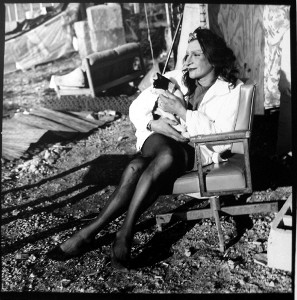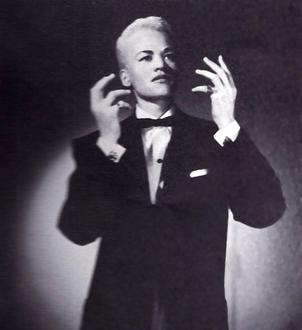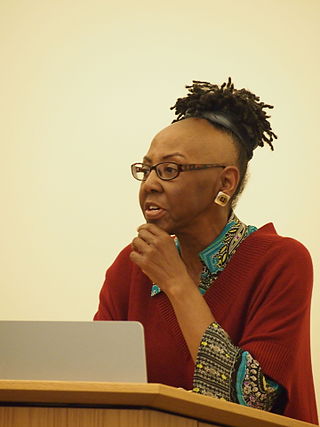
A drag queen is a person, usually male, who uses drag clothing and makeup to imitate and often exaggerate female gender signifiers and gender roles for entertainment purposes. Historically, drag queens have usually been gay men, and have been a part of gay culture.

Drag kings have historically been mostly female performance artists who dress in masculine drag and personify male gender stereotypes as part of an individual or group routine. As documented in the 2003 Journal of Homosexuality, in more recent years the world of drag kings has broadened to include performers of all gender expressions. A typical drag show may incorporate dancing, acting, stand-up comedy and singing, either live or lip-synching to pre-recorded tracks. Drag kings often perform as exaggeratedly macho male characters, portray characters such as construction workers and rappers, or impersonate male celebrities like Elvis Presley, Michael Jackson and Tim McGraw. Drag kings may also perform as personas that do not clearly align with the gender binary. Drag personas that combine both stereotypically masculine and feminine traits are common in modern drag king shows.

Drag is a performance of exaggerated femininity, masculinity, or other forms of gender expression, usually for entertainment purposes. Drag usually involves cross-dressing. A drag queen is someone who performs femininely and a drag king is someone who performs masculinely. Performances often involve comedy, social satire, and at times political commentary. The term may be used as a noun as in the expression in drag or as an adjective as in drag show.

Sylvia Rivera was an American gay liberation and transgender rights activist who was also a noted community worker in New York. Rivera, who identified as a drag queen for most of her life and later as a transgender person, participated in demonstrations with the Gay Liberation Front.

"Everlasting Night" is a song written by Australian singer Dannii Minogue, Mark Percy, Tim Lever, Ian Masterson and Terry Ronald for the compilation Gay & Lesbian Mardi Gras of 1999 (1999). The song was produced by Ian Masterson. It was released as a single in January 1999 in Australia and reached number 42 on the singles chart, largely helped by the fact that the song was the official theme of the 1999 Sydney Gay and Lesbian Mardi Gras.

John Epperson is an American drag artist, actor, pianist, vocalist, and writer who is mainly known for creating his stage character Lypsinka. As Lypsinka, he lip-synchs to meticulously edited, show-length soundtracks culled from snippets of outrageous 20th-century female performances in movies and song.

Stormé DeLarverie was an American woman known as the butch lesbian whose scuffle with police was, according to DeLarverie and many eyewitnesses, the spark that ignited the Stonewall uprising, spurring the crowd to action. She was born in New Orleans, to an African American mother and a white father. She is remembered as a gay civil rights icon and entertainer, who performed and hosted at the Apollo Theater and Radio City Music Hall. She worked for much of her life as an MC, singer, bouncer, bodyguard, and volunteer street patrol worker, the "guardian of lesbians in the Village". She is known as "the Rosa Parks of the gay community."
The San Francisco Drag King Contest is an annual contest for drag kings held in San Francisco, California and founded by performer and producer, Fudgie Frottage. It is the biggest drag king contest in the world, and the longest running drag king competition in the U.S. The related International Drag King Community Extravaganza (IDKE) is the largest drag king performance event in the world but not a contest. The 26th Annual San Francisco Drag King Contest will be held Sunday, August 21st, 2022.

Mimi Imfurst, the stage name of Braden Stewart Chapman, is an American drag performer. She appeared on the third season of RuPaul's Drag Race and RuPaul's Drag Race: All Stars and was a founding member of the girl group Xelle. In 2017, he became the first U.S. drag queen to perform in Cuba, lip-syncing to Madonna's "Express Yourself" with a group of local dancers.

Honey Mahogany is an American activist, politician, drag performer, and singer. She first came to national attention on the fifth season of RuPaul's Drag Race, followed by releasing her debut EP Honey Love. She was instrumental in setting up The Transgender District in San Francisco, where she served as the first director. In 2024, Mahogany was appointed director of the San Francisco Office of Transgender Initiatives.

Finocchio'sClub was a former nightclub and bar in operation from 1936 to 1999 in North Beach, San Francisco, California. The club started as a speakeasy called the 201 Club in 1929 located at 406 Stockton Street. In 1933, with the repeal of prohibition, the club moved upstairs and started to offer female impersonation acts; after police raids in 1936 the club relocated to the larger 506 Broadway location. Finocchio's night club opened June 15, 1936 and was located in San Francisco, California, above Enrico's Cafe at 506 Broadway Street in North Beach.

LGBTQ culture in Eugene, Oregon predates the Stonewall riots in New York in 1969, but that event coincided with organized efforts in Lane County, Oregon, to support and celebrate LGBTQ people. Even though Eugene has been rated on lists of cities friendly to LGBT populations, there are very few venues specifically for the LGBTQ community in the Eugene/Springfield metropolitan area.

Michelle Parkerson is an American filmmaker and academic. She is an assistant professor in Film and Media Arts at Temple University and has been an independent film/video maker since the 1980s, focusing particularly on feminist, LGBT, and political activism and issues.

The African-American LGBT community, otherwise referred to as the Black American LGBT community, is part of the overall LGBTQ culture and overall African-American culture. The initialism LGBT stands for lesbian, gay, bisexual, and transgender.
Stonewall 50 – WorldPride NYC 2019 was a series of LGBTQ events and celebrations in June 2019, marking the 50th anniversary of the 1969 Stonewall riots. It was also the first time WorldPride was held in the United States. Held primarily in the metropolitan New York City area, the theme for the celebrations and educational events was "Millions of moments of Pride." The celebration was the largest LGBTQ event in history, with an official estimate of 5 million attending Pride weekend in Manhattan alone, with an estimated 4 million in attendance at the NYC Pride March. The twelve-hour parade included 150,000 pre-registered participants among 695 groups.
Tony Midnite was a female impersonator, costume designer, activist, and book reviewer.

Landon Cider is an American drag king, actor and host. He won season 3 of The Boulet Brothers' Dragula and was crowned the "World's Next Drag Supermonster".

Kevin Cook, known by the stage name Poison Waters, is an American drag performer. Since the 1980s, Poison Waters has been an emcee, entertainer, and community activist. She is a longtime hostess at Darcelle XV Showplace and has participated in fundraisers, LGBTQ events, public service announcements, and other community activities throughout the Pacific Northwest. Cook has also taught at Portland Community College.
The Jewel Box Lounge, also known as the Jewel Box, was a nightclub & lounge opened by John Tuccillo in 1948. Located on the historic Troost Avenue in Kansas City, Missouri it was one of the earliest establishments in the area to feature drag queens and impersonators as entertainers. At its peak, the Jewel Box Lounge was one of the largest and best-known drag nightclubs in the United States.


















